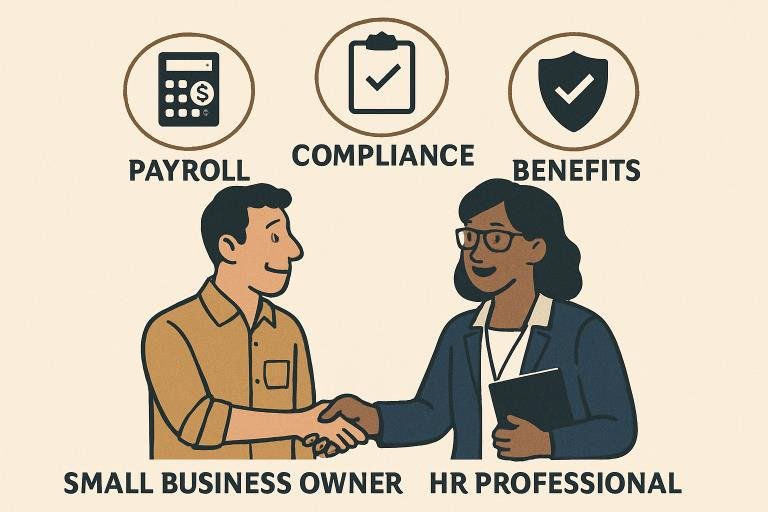Key Takeaways
- Professional Employer Organizations (PEOs) offer SMEs access to comprehensive HR services, streamlined payroll, and competitive benefits.
- By entering into a co-employment relationship, businesses reduce compliance risk and administrative burden.
- Choosing the right PEO requires due diligence concerning service scope, industry reputation, and transparent fee structures.
What Is a PEO?
For small and medium-sized businesses, thriving in today’s rapidly evolving market requires more than just innovative products and services. Navigating human resources management, compliance, and employee retention can be overwhelming and costly. That’s where Professional Employer Organizations (PEOs) step in as powerful partners, helping organizations overcome HR challenges and unlock growth potential by outsourcing critical employment-related functions. When evaluating what are PEOs, businesses quickly realize the wide spectrum of benefits that accompany a co-employment model.
A PEO is a specialized firm that provides integrated HR support by entering into a co-employment agreement with client businesses. This means that while the PEO becomes the official employer of record for tax, benefits, and regulatory purposes, business owners retain full control over operations and workforce decisions. Businesses that leverage PEOs can focus on their strategic priorities while ensuring that HR best practices are expertly handled.
By collaborating with a PEO, SMEs gain access to resources, systems, and expertise that rival those of larger organizations—without the need to scale internal HR departments or navigate complex labor laws unaided. This symbiotic relationship accelerates growth while reducing administrative burden.
In a business environment where regulatory compliance and employee satisfaction are paramount, the value offered by PEOs extends well beyond administrative convenience. According to recent data from the National Association of Professional Employer Organizations, businesses that partner with PEOs grow 7-9% faster. They are 50% less likely to go out of business compared to their non-PEO counterparts.
Key Benefits of Partnering with a PEO
1. Access to Competitive Employee Benefits
One of the most significant advantages of working with a PEO is the ability to offer employees competitive benefits packages traditionally reserved for larger corporations. PEOs pool employees from multiple client companies, using this group buying power to negotiate optimal rates for health insurance, retirement savings plans, dental and vision coverage, and even wellness initiatives. For smaller businesses, this means leveling the playing field in the talent market, as they can attract, reward, and retain skilled employees who might otherwise gravitate towards bigger organizations with richer benefits.
2. Enhanced Compliance and Risk Management
The legal landscape for employers is not only complex but constantly evolving. PEOs specialize in staying up-to-date with local, state, and federal employment laws, providing guidance and safeguards to help minimize risks associated with non-compliance. This can help companies avoid costly penalties, audits, and litigation, allowing them to operate with peace of mind—especially in highly regulated industries. Notably, reputable media like SHRM illustrate how outsourcing HR functions to knowledgeable partners provides critical compliance oversight.
3. Streamlined Payroll and Tax Administration
Managing payroll taxes and related documentation can be a stressful and time-consuming process for business owners. PEOs streamline these tasks, leveraging technology and experience to handle everything from routine payroll processing to calculating and remitting taxes, managing employee records, and ensuring year-end forms are processed correctly and on time. Accurate payroll administration fosters trust and transparency with employees while reducing the risk of costly administrative errors for the business.
4. Cost Savings
Outsourcing HR tasks to a PEO doesn’t just save time—it also results in meaningful cost savings. PEOs’ economies of scale help negotiate better rates on health insurance, workers’ compensation, and retirement plan offerings that individual smaller businesses couldn’t access on their own. Additionally, the efficiency gained from consolidated processes eliminates the need for extensive in-house HR staff or expensive third-party software platforms, freeing up resources to reinvest in core business functions.
5. Improved Employee Relations
PEOs bring objective, third-party expertise to sensitive HR matters, including employee grievances and disputes. Employees often feel more secure reporting issues, knowing these matters will be managed with impartiality and confidentiality. This fosters a workplace culture based on trust, compliance, and well-being, ultimately supporting long-term retention and engagement.
Considerations When Choosing a PEO
The decision to partner with a PEO is strategic and should align with your organization’s needs, culture, and growth objectives. Begin by assessing each PEO’s track record, client references, and industry credentials. Transparency in service deliverables, as well as details on fee structure and service-level agreements, is crucial. It’s also essential to clarify the scope of responsibilities and communication methods to ensure a smooth and productive long-term relationship.
Conclusion
In an increasingly complex business landscape, Professional Employer Organizations stand out as strategic allies for small and medium-sized enterprises seeking to maximize internal resources and achieve sustained growth. By leveraging the expertise, purchasing power, and compliance capabilities of a trusted PEO, businesses can offer competitive advantages to employees while focusing on scaling core operations, driving innovation, and securing long-term organizational success.



